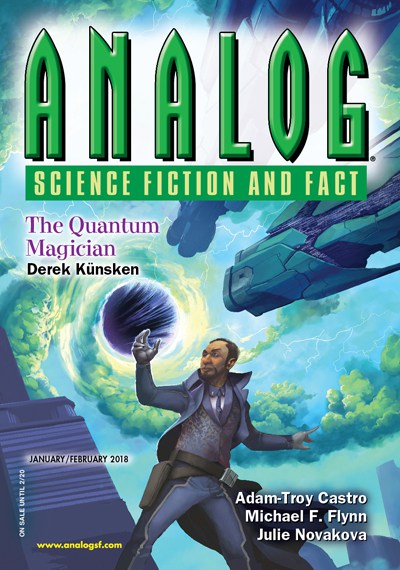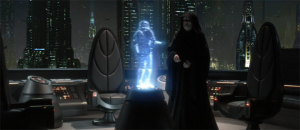
“The Journeyman: Through Madness Gap” by Michael F. Flynn (science fiction novelette)
“Hobson’s Choices” by Mary A. Turzillo (science fiction short story)
“Ten and Ten” by Alan Dean Foster (science fiction short story)
Probability Zero: “Margin of Error” by Paul Carlson (science fiction short story)
“One to Watch” by Andrew Barton (science fiction short story)
“Home on the Free Range” by Holly Schofield (science fiction short story)
“Endless City” by David Gerrold (science fiction novelette)
“When the Aliens Stop to Bottle” by Ian Watson (science fiction short story)
“Two Point Three Children” by Marissa Lingen (science fiction short story)
“Air Gap” by Eric Cline (science fiction short story)
“The Dissonant Note” by Jeremiah Tolbert (science fiction short story)
“Blurred Lives” by Adam-Troy Castro (science fiction novella)
This issue of Analog is the reverse of the companion issue of Asimov’s in which all but two were stories in series as this may have as few as two that are. Teo and Sammi return with another middle added on to their saga. In “The Journeyman: Through Madness Gap,” they must enter the titular “haunted” pass and deal with the dangers there. I can add little to my review of one of the previous installments. If you enjoyed the earlier stories and aren’t tired of them, you’ll enjoy this. Otherwise, you won’t. If you aren’t familiar with them, the slow pace of the open, the simplicity of the resolution, and the middle-ness of it all means it may not work for you, especially if the humor rubs you the wrong way. But, if you do find it funny, you’ll probably find it a fair read. The totally humorless “Blurred Lives” involves Draiken and Thorne catching up to another old enemy, Silver, and embarking on a wager which involves Draiken being imprisoned in a mind-control camp with just one way out. Again, my review of a previous installment, particularly on the low event-to-word ratio and non-ending, basically covers it.
While I’d like to see a few more novelettes in lieu of several short stories, all but one of the other tales (excluding the first part of a serial) are short or very short. I’ll start with my favorites of those.
“Ten and Ten” involves cuttlefish, which are related to the squid, octopus, and such, and have ten “fingers” like humans do. A scientist working on her Ph.D. is trying to teach one sign-language, starting with “hello” and “goodbye.” Her work is complicated by the short lifespans of cuttlefish, hunters in the region, and impatient grant committees, so she’s running out of time. This, while science and fiction, is only barely “science fiction,” if at all, and it may not work for everyone but did for me. It’s very short and I can’t get into it much, but I recommend it.
“Margin of Error” is a short-short which deals with a hotly contested election of the future, in which we follow the vigorous efforts of a couple of political apparatchiks, ending with a nice twist that didn’t even really need the final line because it could already be inferred. It has an important message which doesn’t interfere with its humor.
Other stories include “Home on the Free Range,” which is a solid alien ecology tale of two farmers (who used to be a starship captain’s daughter and a starship grunt) trying to rescue their livestock from the alien critters who nabbed them; a neo-noir VR/meatspace murder mystery in the “Endless City” which suffers a bit from stream-of-consciousness logorrhea, has a tired solution, and is a little long, but is otherwise fine; “Two Point Three Children,” involving a court case over the custody and abuse of an AI “child” and memory edits, which is decent, despite being a little silly in the presentation and having a weak ending; and “Air Gap,” which, like many modern AI stories, is a regression to pre-Asimovian robot SF but effectively deals with a genocidal but quarantined AI until the story blows up in the end when the big reveal shows the underpinnings to not actually make sense.
The remaining stories are “Hobson’s Choices” which would feel like an old Galaxy social satire if it were better and actual SF but simply satirizes the judgmental and conformist “Goodenough Village” in a judgmental, conformist, and non-speculative way; “One to Watch,” in which a guy in mission control (who needs a happy pill, stat) is guiding a rover on Mimas and finds what may be evidence of alien life; “When the Aliens Stop to Bottle,” in which alien octopi have taken over the earth and an advertising executive muses about this, language, and philosophy; and “The Dissonant Note,” in which a starship, currently populated by musical computer iterations of a predecessor, is stuck studying the same planet for 12,000 years with the titular “dissonant note” and another rebel mind plotting against the “harmony” that keeps it there.
Advertisements Share this:- More






